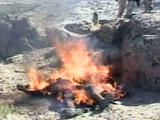Military death toll in Iraq reaches 2,000
 BAGHDAD, Oct 25 (Reuters) - The death of an army sergeant pushed the U.S. military death toll in Iraq to the landmark figure of 2,000 on Tuesday, but President George W. Bush warned more sacrifices were needed before U.S. troops could come home.
BAGHDAD, Oct 25 (Reuters) - The death of an army sergeant pushed the U.S. military death toll in Iraq to the landmark figure of 2,000 on Tuesday, but President George W. Bush warned more sacrifices were needed before U.S. troops could come home.The news cast a shadow over the final results of the Iraqi referendum, which showed that voters had ratified a new constitution, despite bitter opposition in Sunni Arab areas where insurgents are battling to topple the Baghdad government.
The Pentagon said Staff Sergeant George Alexander, 34, died on Saturday of injuries sustained eight days ago when a roadside bomb blew up near his vehicle in the town of Samarra.
The new death toll was a grim reminder that although some progress has been made on Iraq's political front, much work lies ahead in halting insurgent attacks. Increasingly sophisticated roadside bombs are responsible for many of the U.S. deaths in Iraq.
Despite falling public support among the American public for the war, which has been one factor pushing down Bush's popularity in public opinion polls, the president indicated on Tuesday there would be no change in strategy.
"This war will require more sacrifice, more time and more resolve," he told military wives shortly before the Pentagon announcement.
The best way to honour the fallen was to "complete the mission and lay the foundation of peace by spreading freedom", he said.
Bush launched the Iraq war in 2003 hoping for a quick victory with minimal casualties. The Iraqi army was quickly defeated, but within months insurgent attacks had bogged down U.S. forces and delayed plans for the rapid reconstruction of the shattered country.


0 Comments:
Post a Comment
<< Home